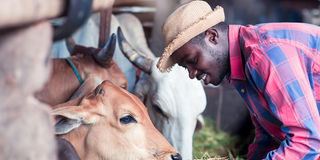Livestock thieves are economic saboteurs, Nyandarua farmers say

The livestock theft syndicate is highly organised, with a robust market and a well-equipped criminal network.
What you need to know:
- "The stolen cows are sold at a throw-away price where a cow worth between Sh150,000 and Sh200,000 is slaughtered which is a short-term gain by the criminal, or sold alive between Sh20,000 and Sh40,000.
- We suspect they are sold at Burma market in Nairobi," says Nyandarua's Assistant Director for Livestock, John Gichuki.
A visit to Kinangop Constituency in Nyandarua County exposes the torment of dairy farmers plagued by rampant livestock thefts since December 2023.
In the Githioro area, 26-year-old Joel Waweru had turned to dairy farming, starting modestly with a single heifer purchased from his casual work savings.
Now, Mr Waweru stares blankly at the empty shed, once filled with hope for a brighter future.
Living beside his cows in a small rented house at Githioro market, Mr Waweru cherished the progressive project that once brought him joy.
But now, like others, he can only produce an OB, Number 02/20/12/2023, from Njabini Police Station as proof of his ownership of five dairy cows.
All his dairy cows were stolen just before they were delivered.
“I am desolate. The cows are yet to be found since December,” Waweru told Nation.
According to Nyandarua Farmers Mega Association Chairperson, Chege Kahuni, over 300 dairy cows have been reported stolen since December 2023, with over 70 incidents in the last two weeks alone.
Nyandarua's Assistant Director for Livestock, John Gichuki, explained that beef from pregnant cows is prized for its superior quality and longer shelf life, motivating thieves to target dairy cattle.

Meat being sold at a butchery in Kenya. Over 300 dairy cows have been reported stolen since December 2023 in Nyandarua County, with over 70 incidents in the last two weeks alone, with farmers saying the theft has impoverished them.
Gichuki described the livestock theft syndicate as highly organised, with a robust market and a well-equipped criminal network.
He attributed the surge in thefts to lax enforcement of livestock and meat movement laws, emphasising the need for stricter implementation.
"The law bans the movement of livestock and meat between 6pm and 6am. Even if the cow, sheep, or donkey belongs to you, you are required to get alternative accommodation for the livestock past the allowed hours. We have law enforcers on all roads, with a lot of roadblocks and that’s part of what they should be enforcing just like in timber and other wood products," said Mr Gichuki.
"The stolen cows are sold at a throw-away price where a cow worth between Sh150,000 and Sh200,000 is slaughtered which is a short-term gain by the criminal, or sold alive between Sh20,000 and Sh40,000.
We suspect they are sold at Burma market in Nairobi," said Mr Gichuki.
Gichuki suspects local involvement in the thefts, exacerbating the plight of predominantly female and young farmers who have invested in dairy farming through loans or savings.
Most of the thieves' targets are women and youth, who have either taken loans to invest in dairy farming or savings from casual jobs.
“There is a trend in Nyandarua where women take loans to invest in dairy farming shortly before their children join Form One. Dairy farming is a reliable source of income, it's what many parents use to educate their children. When that cow is stolen, the parent is left paying a loan without income, while the child fails to continue with their education,” Gachuki explained.
Among the victims is Ms Kezia Njeri, whose cow was stolen just before giving birth, leaving her with a single-milking cow.
"I have been a dairy farmer since 1984 but never experienced cases of livestock theft like it's happening today. The most painful thing is they target cows just about to give birth," said the farmer.
The recent incident involving Ms Peninnah Wainaina, whose cows were stolen last Friday, led to the murder of a prime suspect at Githabai Police Post.
The suspect, John Kariuki, was traced with the cow by a vigilante team.
While pleading for his life at the police station, Kariuki implicated other culprits, including police officers, before the locals took him from the police and stoned him to death.
Kinangop South Sub-County Police Commander Peter Nzimbi refuted claims of police complicity, asserting that police vehicles are deployed for patrols at 10pm daily and not utilised in criminal activities.
"Residents, out of the pain of losing their cows to the thugs, raided Githabai Police Station and killed the suspect. Most of the stolen cows are sold in Naivasha and other areas in Kiambu County.
Others are slaughtered and transported as meat. I deny that a police vehicle is used in the transportation of stolen cows and meat, they are always on patrol at night," said the police boss.




